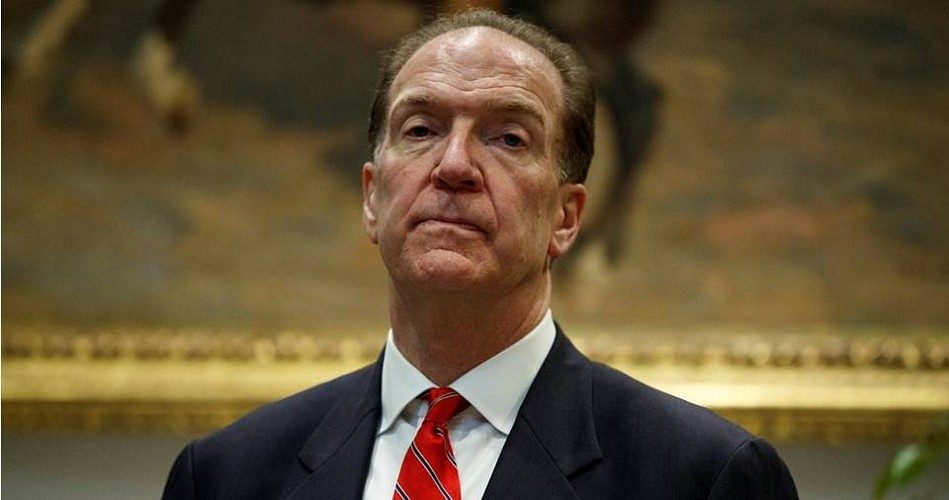
After President Donald Trump named his undersecretary of the treasury for international affairs, David Robert Malpass (shown), to succeed Jim Yong Kim as president of the World Bank, many in the pro-foreign aid establishment expressed their displeasure.
Malpass has been a frequent critic of the policies of both the World Bank and the International Monetary Fund. At a hearing of the U.S. House of Representatives in 2017, Malpass said of the bureaucracy of the World Bank, “They’re often corrupt in their lending practices, and they don’t get the benefit to the actual people in the countries.” According to Malpass, the money tends to go to “the people who fly in on a first-class airplane ticket to give advice to the government officials in the country … but not so much the actual benefit to normal people within poor countries.”
Because the U.S. taxpayer chips in the most money for the World Bank, its presidency has ordinarily gone to an American. For example, after his tenure as secretary of defense for President John F. Kennedy and President Lyndon Johnson during the Vietnam War, Robert McNamara took the reins as president of the World Bank, despite his obvious failure with the Vietnam War by 1968.
A study by the Heritage Foundation has found that the World Bank has a dismal record when it comes to actually improving the lives of the people in recipient countries. Of 66 less-developed countries (LDCs) that had received money from the Bank for at least 25 years, 37 were found to be no better off than they were before they received the loans. In fact, of those 37 nations, the majority were actually worse off after years of “aid” from the World Bank!
Why? Apparently, the main problem is that the World Bank and other similar foreign-aid organizations create a dependency culture. According to economist Stephen Moore, “Some $50 billion has been spent in Africa by the Bank, the IMF, USAID, and other aid programs, and living standards in many of the recipient nations — tragically — have hardly budged.”
The man that Malpass will succeed should he be confirmed, Jim Yong Kim, often clashed with Trump on the issue of climate change. Kim mostly ended any World Bank financing of coal-fired power projects. Malpass has said he would continue World Bank initiatives to fight climate change.
While Malpass should be better than previousWorld Bank presidents (not a high hurdle), his membership in the globalist Council on Foreign Relations (CFR) should give us pause.
Malpass launched his government career under President Ronald Reagan as deputy assistant secretary of the treasury, and later served in the State Department under President George H.W. Bush. After Bush lost to Bill Clinton in 1992, Malpass entered the private sector, eventually becoming the chief economist at Bear Stearns. He was in that position from 1993 until the company collapsed during the 2008 financial meltdown. After leaving Bear Stearns, he ran unsuccessfully for the Republican nomination for a congressional seat in New York.
In 2012, he added a chapter in a book on the importance of sound money, then joined the Trump campaign in 2016 as an economic advisor. He also writes a column for Forbes and often contributes to the Wall Street Journal.
While working in the Reagan administration, Malpass was a strong advocate of small business, and helped craft the 1986 tax cut.
In announcing his selection of Malpass, Trump said, “He has fought to ensure financing is focused on the places and projects that truly need assistance, including people living in extreme poverty.”
Malpass added, “I’m very optimistic that we can achieve breakthroughs to create growth abroad that will help us combat extreme poverty and create economic opportunities in the developing world.”
Perhaps Malpass will make a positive difference at the World Bank, but the reality is that places that have experienced economic vitality are generally those that have received very little aid from the World Bank, such as Hong Kong. Hong Kong, like Japan, has little in the way of natural resources, but the fact that Hong Kong has low corruption and a business-friendly government with respect for private property naturally results in more prosperity in that society.
In a National Review article, Stephen Moore said, “President Trump should make clear that if this corrupt elite prevents Malpass’ ascension to the post, America will pull out of the World Bank and take our funding dollars with us.”
I would go further than Moore. Pull out anyway, for the good of America and lesser-developed nations in the world.
Photo: AP Images



